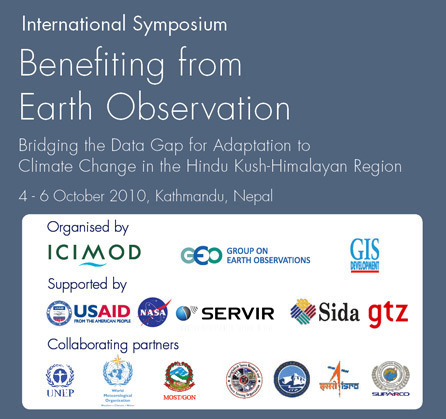The Symposium on "Benefiting from Earth Observation - Bridging the Data Gap for Adaptation to Climate Change in the Hindu-Kush Himalayan Region" focused on remote observations for hazard assessments and predictions.
 6 October 2010: The International Symposium on “Benefiting from Earth Observation – Bridging the Data Gap for Adaptation to Climate Change in the Hindu-Kush Himalayan Region” met from 4-6 October 2010, in Kathmandu, Nepal.
6 October 2010: The International Symposium on “Benefiting from Earth Observation – Bridging the Data Gap for Adaptation to Climate Change in the Hindu-Kush Himalayan Region” met from 4-6 October 2010, in Kathmandu, Nepal.
The Symposium was hosted by the International Centre for Integrated Mountain Development (ICIMOD) and focused on: remote sensing of the cryosphere; spatial decision support systems for ecosystems; space-based information for disaster management; land-cover change and carbon stocks; transboundary air pollution monitoring; and spatial data infrastructure for adaptation.
At the meeting, Michel Jarraud, Secretary-General of the World Meteorological Organization (WMO), highlighted the critical role of the Himalaya region as the “water tower of Asia,” contributing to the headwaters of ten of the largest Asian river basins. Jarraud underscored the importance of remote observations for predicting and assessing natural hazards, alongside on-site observations.
Ahmed Djoghlaf, Executive Secretary of the Convention on Biological Diversity (CBD), underscored that biodiversity in mountain regions is at a particularly high risk to the impacts of climate change. He highlighted the cost-effectiveness of using improved land management to address both biodiversity loss and climate change. He also noted the importance of healthy ecosystems to provide buffers to climate change and assist adaptation, highlighting the central role that climate change will play in the CBD’s 2011-2020 strategy.
At the meeting, the US National Aeronautics and Space Administration (NASA) launched SERVIR-Himalaya Programme. SERVIR is an Earth observation, monitoring, and visualization system that supports decision making and builds capacity, particularly on climate-related events. [Symposium Website] [WMO Press Release] [SERVIR Press Release] [CBD Statement]